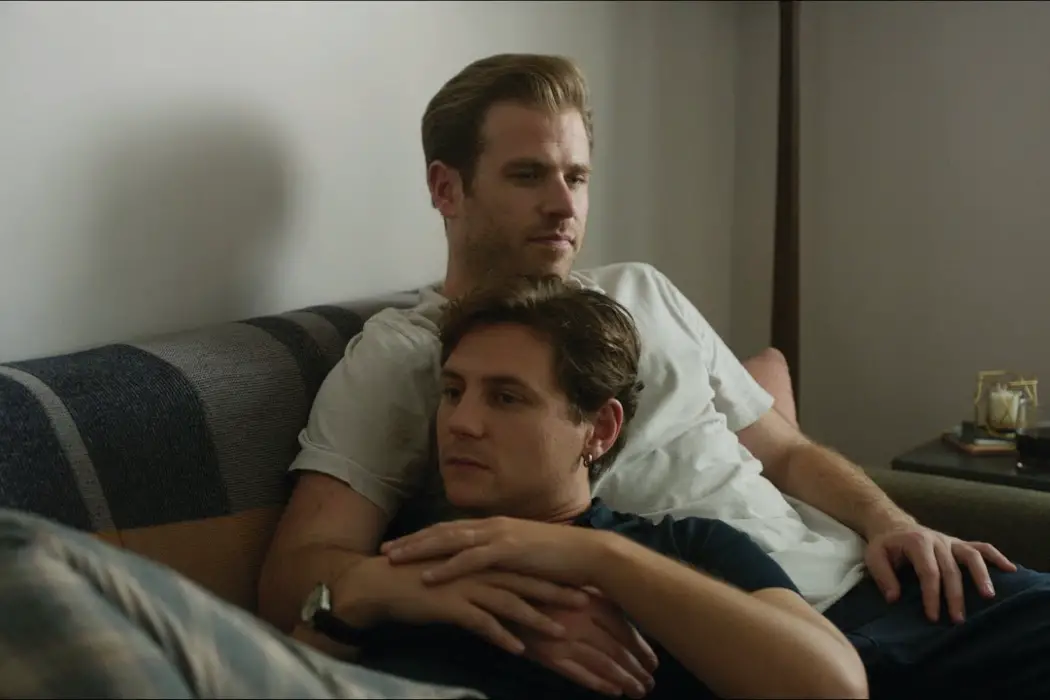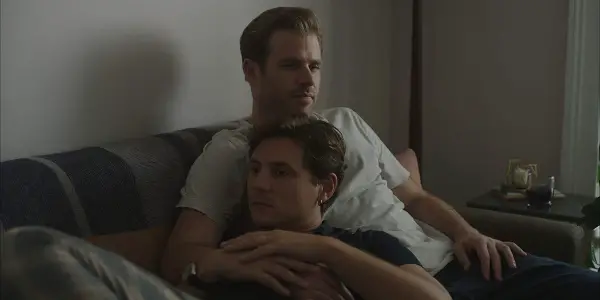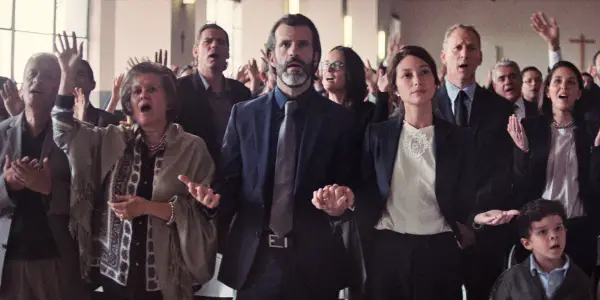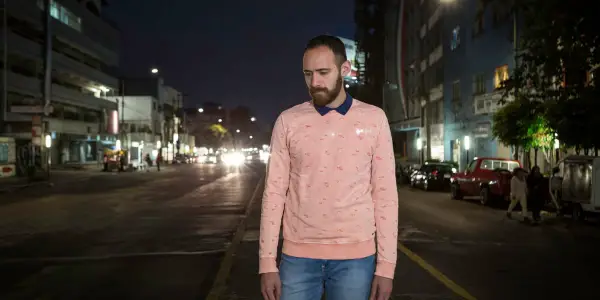NewFest LGBTQ: SELL BY, TREMORS & ONE TAXI RIDE

Andrew Stover is a film critic/writer from the Chicagoland. His…
Presented by HBO, New York’s LGBTQ Film Festival celebrates LGBTQ+ filmmakers and artists from around the globe. The following films will premiere at the festival: Sell By (Opening Night Feature), Tremors & One Taxi Ride.
Sell By (Mike Doyle)

In Mike Doyle’s Sell By, he navigates the sundry contents of relationships, the ones made of platonic and amorous love — methodizing a gay couple, a bi-racial couple, a relationship of a woman and a homeless man, and a teacher and her student, to do so with potency. The layout of Doyle’s New York City-set rom-com is vastly diverse and noticeably sincere, with each relationship unfolding and imploding distinctly. Truth is the structure of most relationships wear-and-tear over time. Doyle cognizes the frequently corroding nature of long-term romances, but Sell By is more determined in helping cultivate the reconstruction of these fractured relations.
For Adam (Scott Evans) and Marklin (Augustus Prew), they are on the verge of celebrating their five-year anniversary. Adam makes a living by covertly painting art pieces for a prosperous artist named Ravella (a suitably mannered Patricia Clarkson), still hoping one day he’ll create pieces that’ll give him artist credit and personal value. Marklin runs a reputable men’s fashion website, procuring a lot of fame and money. Lasting five years, the couple is experiencing communicative and priority issues. Marklin is too caught up in work to give the attention Adam craves. And Adam is too caught up in self-doubt and self-pity to ditch the career endeavor with Ravella and take a leap of faith.
These two are in the center, but friends also surround them, with their own relationship problems. Adam’s best friend Elizabeth (an emotionally fierce Kate Walsh) has been married for over a decade, so I imagine marital hardship is beginning to amplify. Concurrently, Cammy (Michelle Buteau) is dating a homeless man (Colin Donnell), and Haley (Zoe Chao) is fighting feelings for a student. This ensemble cast has ebullient chemistry on-screen, persuading you of all of their correlations.
Adam and Marklin are first seen having dinner with Cammy and her date. Instantly, their connection appears authentic, letting the conversation between them transpire without an ounce of artificiality. From there, Adam and Marklin are becoming distant partners, one of whom can’t deal with the fact that the other one is more successful. Scott Evans and Augustus Prew portray an endearing gay couple in a rom-com, but it isn’t about their homosexuality per se. Other than one moment where they’re slandered, Doyle doesn’t restrict their tribulation to topics about coming out or LGBTQ rights. Instead, Doyle explores their inward doubt; they’re two people who loved each other and still do, but various obstacles get in the way (work, fame, ex-boyfriends).
The female performances are just as strong as the men here, with Michelle Buteau bringing an unparalleled energy that keeps the aura light, and Zoe Chao hilariously trying to tame her character’s dimwitted student from making a move on her. The women’s situations are more tangled and offbeat, but not enough time follows their odd predicaments. Cinematographer Ludovic Littee upholds splashes of woeful blue, and shots that capture the performers from the side, to give the film a more meditative sensation. With natural dialogue and grounded intentions, the cast wins you over with their characters’ delicious brew of dispositions.
When two people begin a deep-seated relationship built on emotional intimacy, they convince themselves it’ll never get stale. For all of the relationships in Sell By, they are signs of rot, but that’s part of the equation. In long-term relationships, you encounter the elated, mundane, doleful and exigent baggage that comes with the commitment, and hopefully, you’ll come out stronger because of it. Even if not all characters are given enough screen time, Doyle’s application is warm, humorous and pensive, mixing the tones of the relationships with ease.
Despite the harsh reality of romance, and how time can only prompt both parties to try harder to preserve what made their relationship work in the first place, Sell By is a charming and heartfelt depiction of romance, one that properly conveys the intrinsic distinctions of romantic relationships. Mike Doyle ensures all love is messily packaged but decidedly valuable and demanding. Romance is like an abstract piece of art, spattered with cold and warm colors, emanating fluctuating emotions that’ll come and go in a relationship. Expect to kiss, fight, love and forge a future together, but not without adversity. Sell By relates to everybody.
Sell By premieres at the New York’s 31st Annual LGBTQ Film Festival on October 23, 2019.
Tremors (Temblores) (Jayro Bustamante)

Tremors (Temblores) is a Guatemalan drama about a gay man caught between faith, family and love. Jayro Bustamante’s nuanced drama unfolds in the crowded streets of Guatemala, a primarily Catholic, socially conservative Central American nation. Although homosexuality is legal in Guatemala, it’s still generally homophobic. So when 40-year-old financial advisor Pablo (Juan Pablo Olyslager) is outed and chooses the man he loves over the life of divinity (as seen through his family’s eyes), he still has to deal with what he lost: his family, and more heartbreakingly, his kids. Will he ever go back to living a lie to be with his kids and gain back the support and love of his family? What determines your identity, anyways? Bustamante’s heartrending tale of identity doesn’t explore novel territory, but Tremors tackles the factors of religion, family and homosexuality in a humane and understated fashion.
An immersive opening sequence, saturated with rain and maneuvering with tracking shots (seen from behind the driver’s head), brings us to the doorsteps of a weeping and unflustered extended family as they anxiously await Pablo, a 40-year-old man who must have done something terrible. Although nothing illegal has been done, Pablo’s been outed as gay. Now, that isn’t disclosed in words, speaking as his pious parents and wife Isa (a compellingly frustrated and misguided Diane Bathen) are unable to say the words without bursting into tears. And it’s unclear when Pablo began his affair with Francisco (a tender Mauricio Armas Zebadua), the man he loves, and when or how they got caught. But that’s not important; what is important is that Pablo hasn’t been his true self for a long time, and only now is he acknowledging his homosexuality.
The divulgence that Pablo has fallen “victim” to homosexuality, is literally treated as an earth-shattering familial puncture, with a tremor occurring right then-and-there, only for the mother to describe the tremor as “God’s punishment”. His sister tries to reason with him (“Did something happen to you when we were kids?”). His mother thinks of it as a test of perseverance (“This is a trial, my love”). While his wife thinks he’s doing irreparable damage to their children. Pablo isn’t motivated to change, and he starts a new life with Francisco in a mucky apartment. But things take a turn when Isa, comprehensibly angry but inculcated by her faith, prohibits him from seeing his own children, gets him fired, and will alter these outrageous terms if he agrees to gay conversion therapy. What should he do? No matter what he chooses, he loses something.
Declaring your true feelings is not always an easy task. Coming out is hard enough, but when you’re outed, you don’t have control of how it’s communicated. For those ensnared in a highly religious family, or located in homophobic Guatemala, being gay is seen as ungodly and unmanly. Contrary to what you may think, Tremors isn’t about actual tremors, and the dramatic weight isn’t theatrical but completely earnest. There’s never any inhibition that Pablo doesn’t actually love Francisco, but the real question is how much pain he’ll have to endure if he chooses to live freely and love openly. The first act outlines Pablo’s genuine love for Francisco, especially considering how he chooses to be with him despite losing his family’s affection — but then again, he never expected to be legally classified as a pedophile.
Bustamante exhumes the kernel of Pablo’s perturbation by setting forth the critical ramifications that affect Pablo, as much as those orbiting around him. But you aren’t meant to commiserate Pablo’s family and what they believe in, you’re solely meant to observe their reactions and scrutinize how far they will go to torture Pablo in the name of a forgiving yet slanted God. When the second half befalls, Pablo’s emotional state is manipulated by the word of the lord. Pablo does eventually participate in a monstrous gay conversion program to make things right with his wife — he undergoes physical and emotional gambits designed to humiliate and belittle him. Pablo wants God’s approval so he can be part of his children’s lives, but every decision Pablo makes has its fair share of implications (some more quieter than others). At one point, Francisco infiltrates the church to hug Pablo, not to yell at him, but to hug him, which holds gravity because it may very well be one of the last hugs (and signs of intimacy) Pablo will get from Francisco.
Pablo reexamines how he could ever leave his family, thinking he made a dire mistake and seeks redemption — but he’s not happy. His self-health is at an all-time low by the time he joins the church, and as he tries to blend in with the God-fearing crowd. Juan Pablo Olyslager’s quietly moving performance thrusts Pablo down a tempting path of uncertainty, emitting Pablo’s brittle reticence and dithering face. Pablo’s shame and humiliation is front and center, with religious people around him invading his personal space and praying the gay away. But Pablo’s pain is mainly unspoken, yet it’s clear that he’s wounded.
Tremors conserves a sober tone and a depressingly tense atmosphere that operates fluidly with Luis Armando Arteaga’s hypnotic cinematography: the photography is stony and soiled, and the camera deliberately sways around, finding the best spots to showcase Pablo’s reactions. For example, when Pablo and Francisco go in a dark corner of a club to watch recently received videos of Pablo’s kids, we don’t see the videos for ourselves, but Pablo’s crestfallen face shows how much he lost when trying to love honestly.
Pablo’s search for identity is mournful without being cloying, and powerful without being loquacious and stagy. Olyslager’s central performance as Pablo is woven with tacit agony and aspiration, and he brings this expressive tale to life in all of its brutal veracity. Tremors is an emotionally involved and gut-wrenching drama about a religious family man torn between faith, family and his love for another man. From the very first scene, you sense the disquietude of the situation, and how Pablo’s love for another man is causing a irrevocable rift between his family. Tremors exposes the torment of those wielding religious power, while also studying whether one’s identity is determined by oneself, or by various factors, and how to live a life if you aren’t being honest with yourself.
Tremors premieres at the New York’s 31st Annual LGBTQ Film Festival on October 24, 2019.
One Taxi Ride (CK Mak)

CK Mak’s One Taxi Ride is a heartrending documentary about Erick, a twenty-something gay Mexican who suffered traumatic sexual abuse as a 17-year-old teenager. “I feel that after 10 years, I am ready because I am tired. I’m tired of hiding, of living a lie.” It’s been an entire decade since Erick went into a taxi, only to get raped multiple times. It’s genuinely scary stuff, but sexual assault is something society is deeply familiar with. There are victims every day who tell their stories, asking for help; while other times, the victim’s pain and suffering go unsaid, and a police report is never officially drawn up.
When somebody is raped, the emotional scarring may not be reparable, but it can be treatable. Even though they were the sufferer, a rape victim can blame themselves. Other times, the victim can generate fears of intimacy because of the tragic assault. In One Taxi Ride, you follow Erick and his attempts to divulge the incident to his family and boyfriend. Describing himself as hot-tempered and stubborn, but not necessarily a bad person, Erick is easy to sympathize with, and the fear of judgment is visibly seen in his dolorous eyes and heard in his trembling voice.
Thirty minutes after establishing Erick’s doubt and apprehension of unveiling the truth, he develops the courage to tell his boyfriend Rodolfo about the sexual assault from his past that affected him profoundly. Rodolfo is solicitous and understanding after hearing Erick’s confession. At one point, Rodolfo does bring up their foundation of truth, and whether or not their relationship is vigorous enough to tell each other anything. Erick and Rodolfo’s abiding connection is firmly planted with warmth. The editing arranges the various close-up shots and low-angle shots in a fashion that conveys Erick’s evolution as a taciturn victim to an uninhibited victim, essentially becoming an inspirational voice for rape victims in Mexico. (On a side note, a few arresting city-scape shots of Mexico City radiate smothering gloom, matching the unsuspecting horror of what Erick went through.)
The unmasking of one’s inner feelings after witnessing something terribly traumatic is never painless; start simple, tell one person you trust thoroughly, and ask them for their guidance. With a slight push from Rodolfo, Erick does eventually tell his family, which triggers bouts of tears and puissant dialogue that helps bring everyone together. There’s nothing more powerful than a supportive family who stays by your side. And there’s nothing more life-affirming than your partner staying with you even when you reveal life-altering information. Not only is Erick a survivor, but he’s also been diagnosed with HIV, living with it and taking medication for a while now — but apparently, Rodolfo already knew, and ultimately doesn’t dismiss him for having it.
CK Mak’s One Taxi Ride is a highly poignant and inspirational documentary that politely asks survivors to speak up. “I’m fighting and I’m here to speak up.” Erick continues his journey of healing by helping others in Mexico who may be petrified to speak up. If a victim stays silent, the culprit wins. It’ll take fortitude, advice and support, but once you find your voice, you start taking back your power.
One Taxi Ride premieres at the New York’s 31st Annual LGBTQ Film Festival on October 24, 2019.
Are you planning to attend the New York LGBTQ Film Festival? Have you seen any of these films? Let us know in the comments!
The NewFest LGBTQ Film Festival goes from October 23-29. Get your tickets & passes now.
Does content like this matter to you?
Become a Member and support film journalism. Unlock access to all of Film Inquiry`s great articles. Join a community of like-minded readers who are passionate about cinema - get access to our private members Network, give back to independent filmmakers, and more.
Andrew Stover is a film critic/writer from the Chicagoland. His film & TV reviews can be found on Film Inquiry & Film Threat.













